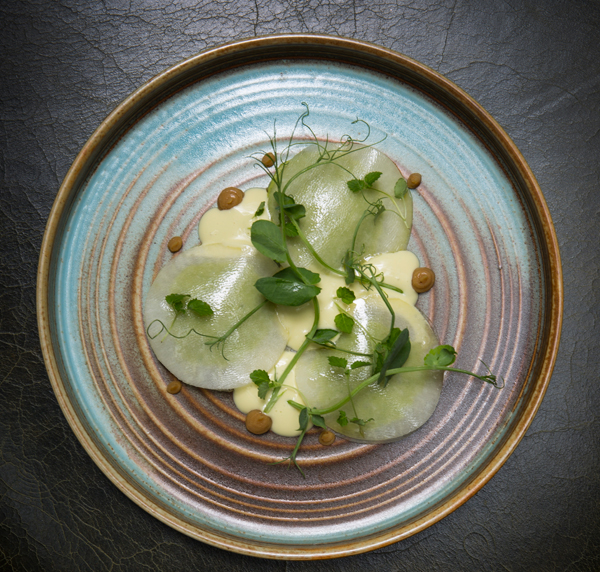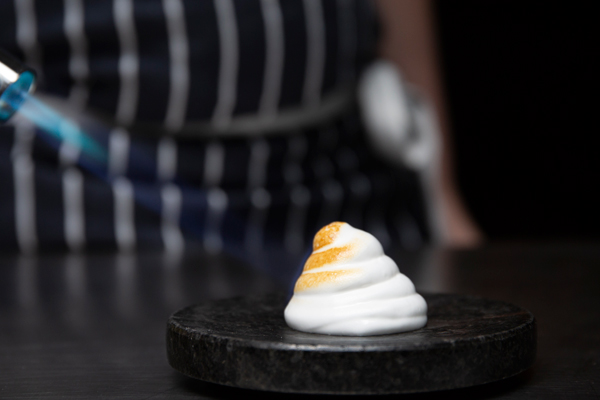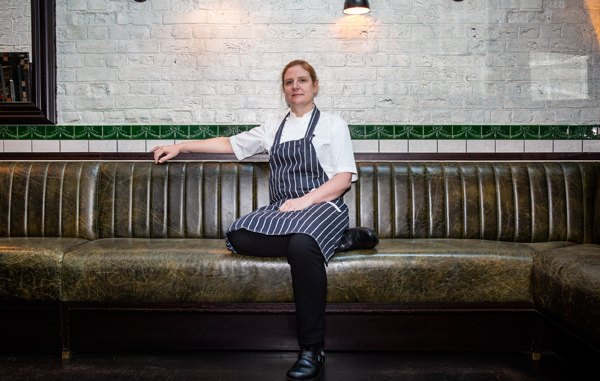Masterclass: Chantelle Nicholson uses aquafaba to create a kohlrabi starter
In casual dining and the grab-and-go sector, the plant-based trend is unstoppable. But Chantelle Nicholson is bringing veganism to fine dining with her miraculous aquafaba recipes. Michael Raffael reports
When Tredwells' Chantelle Nicholson suggested an aquafaba masterclass, she said that few chefs knew about it. The name ‘water-bean' is the clue. It's the unsalted liquid in which pulses, chickpeas especially, have cooked. Its basic use is to replace egg as a binder in meringue, mayonnaise and some mousses.
It is not an additive sold by, let's say, a Spanish company specialising in ingredients designed for molecular cuisine. Pick a 400g can of chickpeas off a supermarket shelf. Drain the contents. The residual liquid, about 160g, is aquafaba.
People have been boiling pulses for millennia. The discovery lies in unlocking the potential of protein and starch that has leached into the water. Whisked, it forms a stable foam just like egg white. It also acts like whole egg to form a mayonnaise-like emulsion when it is blended with oil.
Planted (Octopus, £25), and it is also used in dishes on her vegan tasting menu, as well as the Á la carte.
Aquafaba from a can or homemade
The simplest thing is to buy a can of salt-free chickpeas and drain the liquid, but not all brands are identical and the liquid may need reducing.
If you are going to make your own, soak a cup of dried chickpeas overnight and drain them. Put them in a pan with four times their volume of water. Boil, skim and simmer on the side of the range with a lid on for 70 minutes. Cool the chickpeas and the liquid before straining. If you reduce the cooking liquid it will have stronger binding properties.
Avocado oil aÁ¯oli (for the kohlrabi ravioli recipe)
Scale up the recipe as necessary. Tredwells usually prepares 1kg batches. 50g aquafaba
½tsp Dijon mustard
1 garlic clove, finely grated
1tsp rice wine vinegar
40ml avocado oil
50ml olive oil
Salt
Put the aquafaba in a jug roughly the diameter of a blender. Add the mustard (1) and garlic, then blitz to a whitish foam. Add the vinegar. Continue blending while you incorporate the oils in a slow stream. When it's ready, it will hold its shape on the blender like any aÁ¯oli (2).
Alternatively, you can whisk the aquafaba, mustard, garlic and vinegar together and incorporate the oils as for a classic mayonnaise.
Note: the recipe can be adapted to any similar aÁ¯oli or, minus the garlic, be made into a basic mayonnaise.
Costing
Chefs can find a Thermomix aquafaba mayonnaise recipe at www.thermofun.com/member-spotlight-aquafaba-mayonnaise.
The cost of aquafaba is significantly lower than using eggs, providing that the kitchen makes use of the leftover chickpeas. At Tredwells, they are currently made into a type of polenta and fried to become a snack known as panisse (it's a speciality of Marseille).
The kohlrabi ravioli sells for £7 on the Á la carte and comes in under the 70% GP to which Nicholson operates.
Kohlrabi ravioli
Note: the quantities here are taken from Chantelle Nicholson's Planted (reviewed in The Caterer, 27 April 2018). They will scale up accurately. Tredwells sells between 12 and 20 portions per day.
Serves 4 2 large kohlrabi, peeled
1tsp Japanese rice vinegar
1tsp avocado oil
Salt
For the pea guacamole
1 large avocado, halved, stoned and peeled
8 mint leaves, finely chopped
8 coriander leaves, finely chopped
100g defrosted frozen peas
1 finely diced shallot
½ lime, zest and juice
¼tsp wasabi paste
Sea salt and freshly milled black pepper
130g avocado oil aÁ¯oli
To garnish
2-3tsp citrus jam
Citrus jam
2 lemons (or equivalent weight of other citrus fruit)
60g caster sugar
30ml olive oil
Salt
Preheat the oven to 200°C, 180°C fan-assisted. To make the citrus jam, place the whole fruit on a roasting pan or similar. Bake for 40 minutes until the skin has collapsed and the lemon is soft (3). Cool and blend with sugar, oil, salt and 25ml water. Transfer to a small piping bag.
Pea shoots and micro-herbs or flowers
On a Japanese mandoline, slice 24 discs of kohlrabi. They should be no thicker than 2mm each and about 6cm in diameter, and should be almost transparent.
Whisk the vinegar and avocado oil together, ready to brush the kohlrabi when assembling the ravioli.
Put all the pea guacamole ingredients in a blender and pulse to obtain a semi-smooth purée. Season to taste. Fill a small disposable piping bag with the purée. You'll have a little more than you need.
Each portion has three ravioli. For each one, brush three kohlrabi discs with the oil and vinegar dressing and arrange them on the plate(4).
Snip off the end of the piping bag and pipe 10g-12g pea guacamole into the centre of each round (5). Brush three more discs with dressing and place them on top (6). Season very lightly. Press the edges together to seal the ravioli.
Pipe blobs of avocado aÁ¯oli and smaller dabs of the citrus jam between the three ravioli(7). Decorate with pea shoots and micro-herbs (8).
Aquafaba uses
CAN DO
•Egg-free mayonnaise
•Emulsified dressings
•Meringues
•Macarons
•Chocolate mousse
•Vegan butter
CAN'T DO
•Sponges
•Egg-based cakes
Meringues
Tredwells uses aquafaba for both French and Italian meringues. The recipes mimic the classic versions by using 30g aquafaba to 60g caster sugar. According to Nicholson, the only difference is that the whisking process takes longer than with egg whites. Dry out French meringue at 80°C. Boil sugar to 119°C for Italian meringues.
On the Tredwells menu and in Planted
Recipes containing aquafaba •Chocolate mousse
•Peanut butter pudding
•Smoked sweet potato rouille
•Tomato pain perdu
•Lime drizzle cake
•Meringues
•Avocado oil aÁ¯oli
•Egg-free brioche
Chantelle Nicholson
Chantelle Nicholson, chef-patron of Marcus Wareing's Tredwells restaurant in London's Covent Garden and director of operations at Wareing's restaurant portfolio, wanted to keep the word "vegan" off the cover of her book Planted. She lost that skirmish with the publisher, but it's in a typeface small enough to miss unless you're looking for it. Her real campaign, she would argue, is for plant-based foods to be given equal billing with all forms of animal protein.
Born and brought up in New Zealands's North Island, she wasn't, she recalls, short of meat on her plate, but the fruit and vegetables in her diet made more of an impression on her. "My father was a horticulturalist and we always had things growing. We had a garden and we'd go outside to pick carrots, lettuce, lemon grass and herbs. I had family in central Otago who had orchards, so every summer I'd go there."
If vegetables come fresh out of the ground there's no reason, she says, to be over-elaborate: "My cooking style is more about enhancing great ingredients. At the moment we've got a baked carrot dish where we glaze them with carrot juice that we've reduced right down, so, if anything, we're making them taste more like carrots rather than anything else."
Working alongside Wareing for more than a decade has given her a formidable range of classical skills. Applying them to vegetarian cooking in a restaurant that isn't vegetarian is atypical: "A roasted cauliflower is delicious. You have the same caramelisation [Maillard reaction] happening, so for me it's taking those classical techniques and focusing them on vegetables.
"I approach vegetables in the same way I do meat. If you take a steak and you steam it, it's not going to taste nice. If you take a cauliflower and steam it, why should you expect a child, for instance, to be happy eating it? So why don't we put the same love, attention and care and thought into what we do with vegetables?"
Using aquafaba is just an extension of that logic. If a vegan sits down for a meal, why shouldn't he or she enjoy aÁ¯oli? "By using the chickpea liquor as the emulsifier, you have the same garlicky richness. You've got the same texture, the same flavour, the same mouthfeel."
Writing books targeted at consumers, she would concede, is different from the everyday cooking of a professional kitchen, where technology brings consistency, even when sparingly used. The bottom line, though, she insists, must always be deliciousness. "Some technology is more useful than others. Water-bathing is great for vegetables. We cook leeks in a miso broth that way."
Before she came to England and put on whites, Nicholson practised in her home country as a lawyer; a background that has given her a left-field attitude to her profession. "I've always looked at things a little differently," she says. "I'm about practicality. I may be able to create something that looks beautiful on a plate and tastes delicious, but if I can't do that time and time again, if my team can't do it for the restaurant, then there's no point."
















